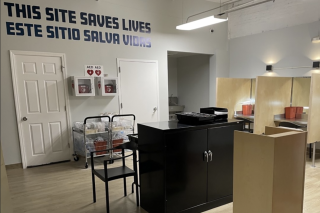This is a conversation between Jeffrey Steen, Assistant Professor in the Simmons University School of Social Work, and Ivy Waikwa, an undergraduate student majoring in Psychology.
Tell me about the project you are working on for the Hazel Dick Leonard Faculty Fellowship.
Dr. Steen: In recent years, the drug overdose crisis has been exacerbated due to numerous factors, such as an increasingly tainted drug supply, inadequate treatment services, shame and stigma, and punitive policies reflecting a War on Drugs approach that disproportionately harms communities of color and other historically marginalized groups. The development of overdose prevention centers (OPCs), also referred to as supervised consumption sites, offers promising opportunities to reduce substance-related health disparities and drug fatalities. I am writing a paper that urges social workers to develop practices and policies that advance OPCs and other harm reduction approaches. This commentary, which is slated to be published in an academic journal, is informing the development of my upcoming presentations at professional conferences and with community groups, in addition to my formulation of grants that will study OPCs in Massachusetts. These efforts are guided by a social justice approach and discussions with community members and health professionals who have been impacted by substance misuse.
What inspired you to start this project?
Dr. Steen: So for a couple of decades, I've worked as a social worker in the field of addictions. I've learned so much from people's experiences in treatment and what works for them and what doesn't work. I've noticed that a lot of the models in place for helping people recover are failing to do so and really don't support the development of programs and approaches that can help people explore their substance use safely. These approaches should assist them in making changes and offer services attuned to their needs. Historically, substance use treatment has been punitive, especially since the War on Drugs, and has disproportionately affected communities of color and those who are unhoused. So, we desperately need to develop new ways to address these issues as a country. I bring my experience as a clinician and want to continue dedicating my career as a teacher and researcher to understanding these issues and making an impact. I also identify as a person in recovery from substance use, which informs and motivates my commitment to addiction recovery. I've seen many clients, friends, and neighbors pass away due to substance use, so for me, this isn't just an intellectual pursuit, but something deeply personal that I bring into my work as a teacher, scholar, and social worker.
You mentioned working as a social worker for 20 years. What initially drew you to this profession?
Dr. Steen: Growing up with white privilege, I've always felt a responsibility to address societal injustices. My family, despite struggling financially, benefited from the assistance of social workers. However, I also witnessed their limitations in providing effective support. These experiences motivated me to pursue a career in social work, aiming to make a positive impact and address systemic issues contributing to inequality. Social work's focus on both macro-level policies and individual interventions aligned perfectly with my values and interests.
You mentioned that the goal of this project is to help people in the community. How do you think those who read about your work would change?
Dr. Steen: The paper I'm working on is essentially a call to action for social workers, urging them to support the development of overdose prevention centers nationwide. Unfortunately, many social workers have misconceptions about substance use and treatment effectiveness. Through this project, I hope to provide a better understanding based on both research and providers' experiences at overdose prevention centers. This is just one part of a larger trajectory for me, including a book deal focusing on substance use and clinical practice.
Congratulations on the book deal! I can imagine it's both exciting and a bit overwhelming to write your first book.
Dr. Steen: Definitely, but I'm fortunate to have guidance from my dissertation chair at NYU. I've collaborated with someone who has extensive experience and expertise in addiction treatment, and we're co-authors on this project. Her guidance has been invaluable, and I'm honored to learn from her.
What are some challenges being faced when trying to open or advocate for OPC’s?
Dr. Steen: The legislation faces opposition, with some expressing stigmatizing views about substance use and OPCs. However, a coalition called MA for OPC, comprising hospitals, community organizations, and advocates, supports the initiative and is working to ensure best practices are implemented. My paper aims to provide recommendations based on global best practices to inform the development of OPCs in the US.
It's truly heartbreaking that such a project that could potentially save thousands of lives is so opposed. What else would you like the public to know about your project?
Dr. Steen: It really is, and I'm grateful for the opportunity to share more about my project. As I navigate my role as a social work provider and community advocate in Boston and New England, I'm committed to learning from individuals with diverse experiences and collaborating to address the unique needs of our communities. Thank you for your interest and support.
Edited for length and clarity.

